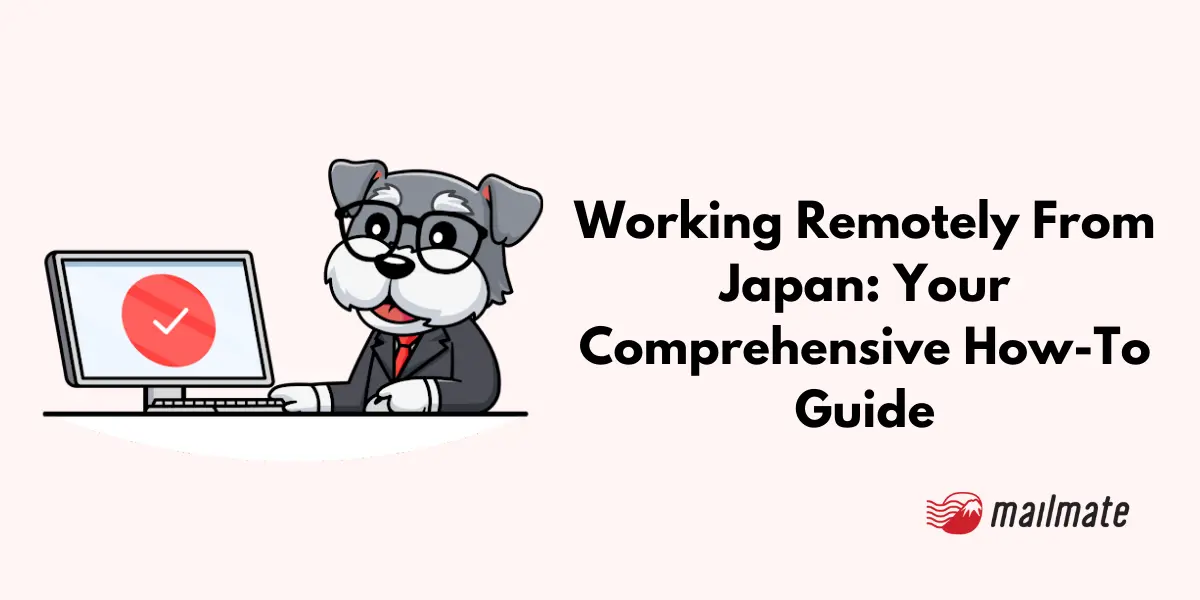Working Remotely From Japan: Your Comprehensive How-To Guide

So, you want to work remotely from Japan? Well, you’ve come to the right place.
Working in another country can be a bit tricky as you have to consider hurdles such as the type of jobs you can work in, visa requirements, and navigating Japanese tax systems.
This guide will help you fully understand the ins and outs of working remotely from Japan.
Japanese remote jobs for foreigners

The number one thing is to have a job in Japan. Whether you are employed by a Japanese company or want to be a freelancer, having a secured job will make the process of working in Japan possible.
While that job might not be remote at first, you can always ask for hybrid or remote work once you have established yourself in your company. However, that also depends on the nature of your work.
Some industries are more remote-friendly and can help you earn money online in Japan, such as:
Technology and software development
Education and online learning
Writing and translation
Marketing and digital advertising
Customer service and support
Consulting and freelance work
Working in any of these industries makes remote work in Japan much more possible.
The type of visas foreigners can have in Japan

Now that you have a job secured, next is the visa process. For the most part, your employer will help you with the visa process.
Japan offers many types of visas depending on the type of activities you will be doing. As a foreigner, you will have to apply to your nearest Consulate-General of Japan. Once a visa is obtained, you will be able to stay in Japan for 6 months to 5 years.
Japanese work visas
Each of these visas will allow you to work in Japan for a certain amount of time. Depending on the visa you get, you may only be able to do work-related activities in the designated categories.
1. Working visa
Japan’s working visas are one of the most common visas to obtain.
Their Engineer/Specialist in Humanities/International Services covers many job categories from teaching, engineering, and journalism to and other specialized fields.
2. Working Holiday visa
Japan has bilateral arrangements with 29 countries for people between the ages of 18 and 30 years to enter each other's country to spend the holiday there while allowing the individual to work to help fund their travel.
Go to the Ministry of Foreign Affairs of Japan's Working Holiday Programmes page for more information.
Japanese business visas
Depending on the type of business you have and your business plans in Japan, it is possible to do everything remotely.
3. The Business Manager visa
Previously known as the Investor visa, the Japan Business Manager Visa allows you to stay in Japan for a year to manage or engage in activities for your business in Japan.
It is mainly used for those with already registered companies and a well-structured business plan.
4. The Four-Month Business Manager visa
This visa is completely separate from the Business Manager visa for Japan.
As the name suggests, you can stay up to 120 days, four months, in Japan. It's mostly for those who need time to complete the initial company registration procedures, secure an office space, and finalize other paperwork.
With a Four-Month Business Manager visa, the eligibility requirements are stricter, but the application process is much simpler.
5. The Startup Visa
Obtaining the Japan Startup Visa will allow you to try to launch your business in Japan within a year without needing a business registration, a budget, or office space in the beginning. This visa is perfect for entrepreneurs wanting to start a business in Japan.
One catch is that you will need a solid plan and an approval form from a specific Japanese city.
For more information, take a look at Japan’s Ministry of Economy, Trade and Industry (METI) Startup Visa Program.
Other Japanese visas
There are two other visa statuses in Japan, and they are “Permanent resident visa” and “Spouse or child of a Japanese national or a PR visa holder.” Both require paperwork to obtain these visas.
Having one of these visas will allow you to work in Japan without much trouble.
Japanese tax system

I won’t go in-depth here, but essentially if you are employed by a Japanese company, your taxes are automatically taken care of by your employer.
Your employer will withhold the correct amount of income tax directly from your salary throughout the year. They might adjust the amount of tax based on the Japanese government’s tax guidelines.
However, if you are a self-employed or a freelancer in Japan, then you will take account of your own finances and file your Final Income Tax Return in Japan.
Getting a remote office space in Japan
There are two ways to work remotely in Japan.
One of the most common places to work remotely in Japan is at home. Working from home has its benefits from being cost-effective, having no commute time, and more privacy.
Another common place to work remotely in Japan is at a coworking space. They are everywhere in Japan. While more expensive than working from home, coworking spaces offer networking opportunities, technical IT support, and plenty of outlets for building up your professional image.
Frequently asked questions
Is it legal to work remotely from Japan?
Yes, it is legal to work remotely in Japan as long as you have the correct visas and paperwork. Depending on the type of visa, you may have to submit a "Permission to Engage in Activity other than that Permitted under the Status of Residence Previously Granted" form.
Is Japan good for digital nomads?
With an affordable cost of living, plenty of office spaces, timely public transportation, a low crime rate, famous attractions, and delicious food, Japan is becoming a popular location for digital nomads. And Japan has recognized this demand as the government is trying to implement its own digital nomad visa.
Is remote work a thing in Japan?
Yes, about 51% of Japanese workers reported that their company allows remote work. Depending on the type of job, some employers are more flexible than others to allow remote work.
In closing
Working remotely from Japan might feel like a distant dream. However, many remote workers in Japan have done it, so it’s definitely possible for you, too.
Spending too long figuring out your Japanese mail?
Virtual mail + translation services start at 3800 per month. 30-day money-back guarantee.

